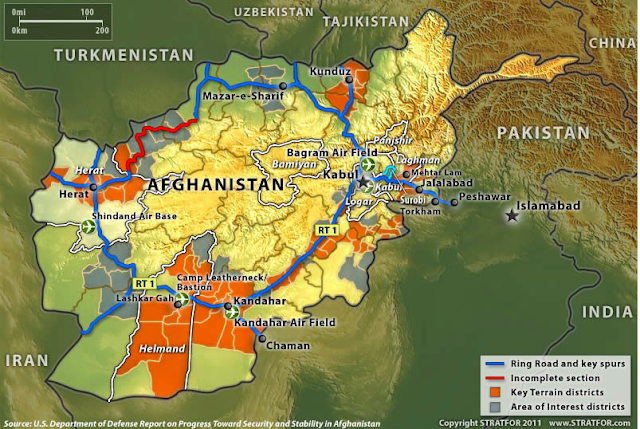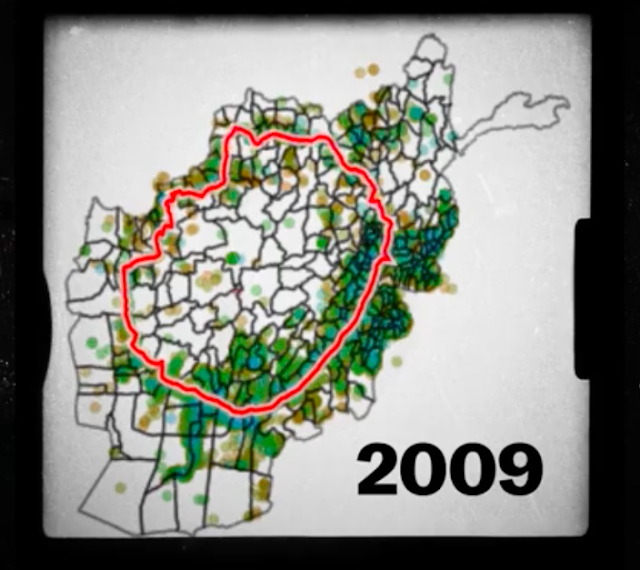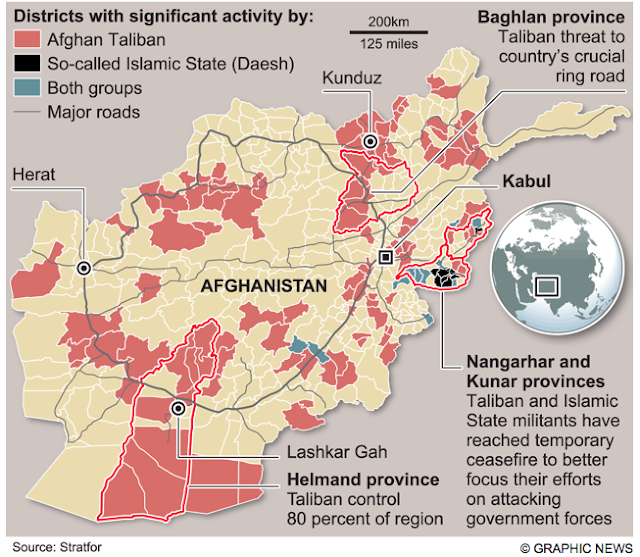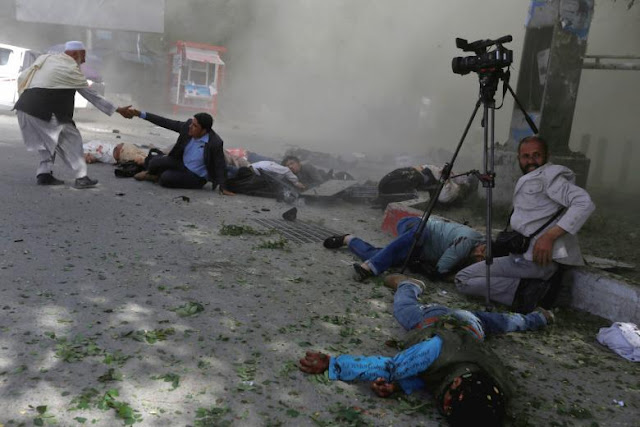 |
| Courtesy of Stratfor |
The most important road in Afghanistan runs from the capital, Kabul, to the second biggest city, Kandahar. It was the cornerstone of the US strategy in Afghanistan after the invasion in 2001. It cost over $200 million to build and hundreds of lives were lost defending it. Despite all that, the Kabul to Kandahar highway today, is broken.
A 2016 audit report found that the road was "beyond repair” and "needed to be rebuilt.” And if it becomes impassable the “the central government will collapse." To understand how a road this significant and this costly can be falling apart, you have to ask: where did the US go wrong in Afghanistan?
In 2001:
- After 9/11:
- The US invaded Afghanistan.
- This is where Al Qaeda planned the attacks.
- Al Qaeda was sheltered by the Taliban, who controlled the Afghan government at the time.
- Both groups were driven out of Kabul in a matter of months.
- The US strategy soon shifted from combat to stabilizing and rebuilding the country.
But Afghanistan is a difficult place to control and rebuild. It’s mountainous, and mostly rural. The population is fractured among several ethnic groups and local communities often operate autonomously. To make matters worse, there were only 31 miles (50 km) of paved roads in 2002, which meant most of these communities were isolated.
The US decided to change that by revolving The Ring Road that was partially built by the Soviet Union in the 1960’s, but had been destroyed by decades of war. It would run in a 1,988 mile (3,200 km) loop connecting Afghanistan’s 4 biggest cities --Kabul, Kandahar, Herat, and Mazar-I-Sharif-- essentially tying these communities together.
 |
| Courtesy of VOX Media |
In 2003:
Starting with the Kabul to Kandahar section, the US, World Banks, and several other major countries pledged $1.5 billion to the Ring Road.
- It was showing promise:
- Trade circulated through more places.
- Medical services reached more people.
- It gave the new government in Kabul more legitimacy around the country.
- Allowed US and NATO military to send troops and supplies around the country faster--this enabled them to keep the Taliban in check.
“Where the roads end in Afghanistan, the Taliban begin. In other words, roads promote enterprise. Enterprise promotes hope. Hope is what digests this ideology of darkness. “ — George H.W. Bush
But the US didn’t finish the job.
Still in 2003:
The US invaded Iraq--making Afghanistan 2nd priority.
- Funding
- Reconstruction
- Resources
- Experienced leadership:
- Generals
- Diplomats
Were all diverted to the war in Iraq.
Wikileaks Geospatial Attack Data, 2004-2009:
The Ring Road was far from complete yet reconstruction funding was cut by $1.2 billion a few years later.
The US preoccupation with Iraq gave the Taliban an opening to return--and they seized it.
When you look at the Taliban activity in the region from 2004 through 2009, you can see it escalate.
 |
| Courtesy of Drewconway.com
Draw the Ring Road, and you can see where those activities are concentrated.
|
- Ambushes
- Roadside bombs
- Took hostages
- Killed US soldiers and road construction crew
The Taliban had taken back significant territory, especially in the south and east along the Kabul to Kandahar highway. Afghanistan was in a full-blown insurgency.
 |
| Courtesy of VOX Media |
In 2009:
President Obama decided to recommit to the war in Afghanistan. He sent thousands of troops in what was called, “The Surge”.
"Afghanistan is not lost, but for several years it has moved backwards. There is no imminent threat of the government being over thrown, but the Taliban has gained momentum. In short, the status quo is not sustainable.” —Barack Obama
 |
| Courtesy of the Institute for the Study of War/Brookings Institute
The US and NATO made some some progress in the south. But it quickly became clear that the Taliban would not be easily defeated.The more troops deployed to Afghanistan, the more the Taliban launched attacks.
Taliban Target: Road Crews
With the military struggling to clear territory, it became nearly impossible to rebuild roads, as the Taliban continued to attack road-crews.
“The degraded security environment has made this the most dangerous project our company has attempted. We have suffered 21 killed, 51 wounded, and 4 missing.” —Larry Walker; President, Louis Berger Consulting. This forced construction companies to hire security, which caused budgets to sky rocket:
From Combat to Support:
18 months later, time was up. President Obama announced that he’d start bringing troops back.
“After this initial reduction, our troops will continue coming home at a steady pace, as Afghan security forced move into the lead. Our mission will change from combat to support.” —President Obama But as the US troops withdrew, they left behind the oversight of infrastructure projects, including roads. Crippling Corruption: In 2012, the USAID cut funding for the road construction and the Ring Road was abandoned. Road building and maintenance became the responsibility of the Afghan government which was crippled by corruption.
With only 11,000 troops in the country—mostly in the cities—the Taliban swept back through Afghanistan. In 2017, they controlled almost half the country—that’s more territory then they’ve had since 2001. That includes large sections of the Ring Road which are one of the main reasons why the road is in dire shape.
According to a 2016 inspection, "20% of the roads were destroyed and the remaining 80% continue to deteriorate". The US has no plans to give rebuilding Afghanistan a 3rd chance. As US Presidents change—so do their plans with Afghanistan. In 2017, President Trump committed more troops but made it very clear: “We are not nation-building again. We are killing terrorists.”—President Donald Trump As the Ring Road continues to deteroriate, it’s no longer a symbol of US efforts to rebuild Afghanistan—instead it serves as a reminder of a job that was never finished. |








